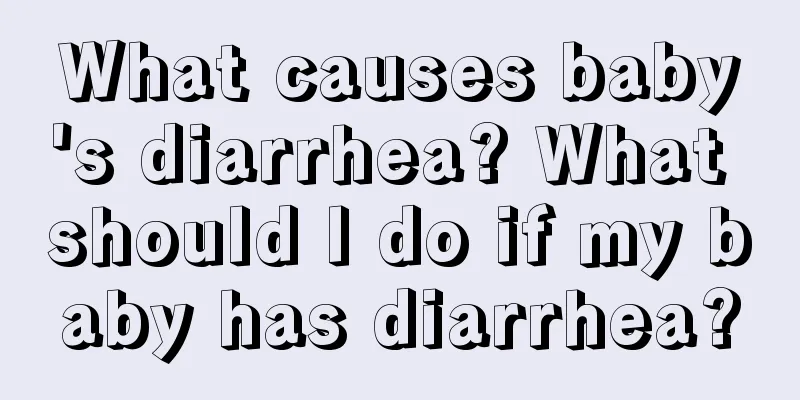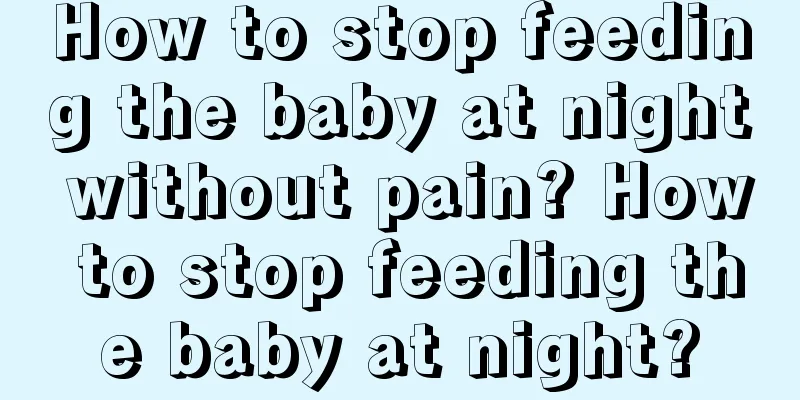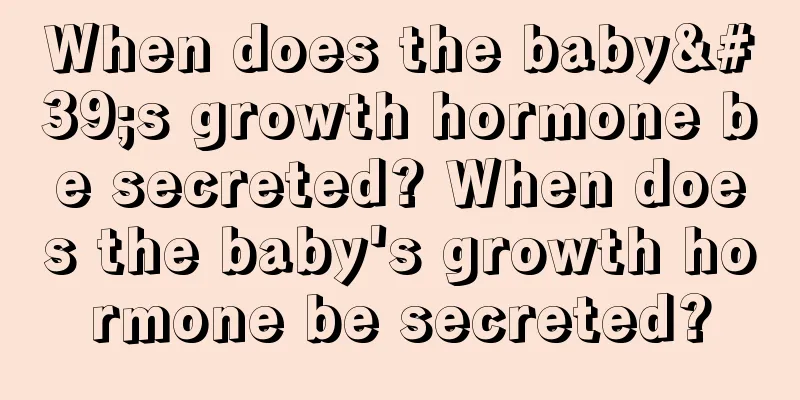What causes baby's diarrhea? What should I do if my baby has diarrhea?

|
When I was changing my baby's diaper, I found that he had diarrhea. What should I do? I pay attention to his diet normally. What is the reason for this? What causes baby diarrhea?1. Gastroenteritis. Gastroenteritis (also called the stomach flu) is an inflammation of the stomach and intestines that can cause diarrhea in babies, children, and adults. Gastroenteritis is very common and can be caused by many different viruses. The most common cause is rotavirus, which accounts for half of all children hospitalized for diarrhea, and it occurs most often in late fall and early winter. If your baby has diarrhea and is also experiencing stomach cramps, vomiting, and a low-grade fever, it is likely gastroenteritis. Be aware that your baby may be losing a lot of fluid if he or she is not eating or drinking much at this time. 2. Bacterial infection. Bacterial infection causes severe diarrhea (sometimes accompanied by vomiting), abdominal pain, bloody stools, and fever. Some of these infections can heal on their own, but some can be very serious (such as infections caused by E. coli contained in undercooked meat). Therefore, if your baby has the above symptoms, you should take him to see a doctor. The doctor will examine him and may also do a stool culture to see if it is caused by a bacterial infection. 3. Parasitic infections. Parasitic infections can also cause diarrhea. For example, giardiasis (also called pear-shaped flagellation) is caused by a parasite that lives in the intestines and can only be seen under a microscope. Parasites are easily spread when living in groups and require special medications. Therefore, developing good hygiene habits, such as washing hands after changing diapers, is the best way to stop the spread of parasitic infections. 4. Antibiotics. If your baby develops diarrhea during or after antibiotic treatment, it may be related to the medication. Talk to your doctor to see if you can switch to another medication or treatment. 5. Food factors. Drinking too much fruit juice (especially juice containing sorbitol and high concentration of fructose) or too many sugary drinks may also make the baby's stomach uncomfortable and the stool becomes loose. Give the baby less of these foods, and it should get better in about a week. It is recommended not to give juice to babies under 6 months old. After 6 months, the daily intake of juice should not exceed about 113~170 ml. In addition, improper preparation of formula milk may also cause diarrhea in babies, so when you prepare the formula, add water in proportion. 6. Milk allergy. Milk allergy is not uncommon, but it can also cause diarrhea and sometimes vomiting. If your baby is allergic to milk, he may show allergic symptoms within a few minutes to a few hours after drinking formula milk or eating dairy products made with milk. If you suspect your baby's diarrhea is related to milk, please consult a doctor for detailed information. What to do if your baby has diarrheaIf the baby has diarrhea, you can feed the child some probiotics, and be careful not to eat cold food. If the baby has a red bottom, be sure to wash the bottom with warm water. How many days does it usually take for a baby to have diarrhea?Generally, the condition of watery diarrhea in infants will improve in about three days, which is mainly determined by the child's condition and physical fitness. Parents are advised to pay attention to the child's health and send the child to the hospital for examination in time. According to the doctor's advice, the child can take medicine, which is beneficial to the recovery of the condition. Also pay attention to the child's personal hygiene, and the milk bottles used should be disinfected in time to prevent the child from being infected by viruses, which will increase the gastrointestinal burden on the child and be detrimental to the recovery of the condition. You can also let the child drink more water to replenish the body's water and prevent the child from dehydration. What is the reason for the baby's diarrhea with mucus?1. Digestive system diseases. Generally, if the small intestine is inflamed or the baby suffers from acute gastritis, the baby will have diarrhea with mucus. If the baby's stool contains blood in addition to mucus, it may be intussusception. Intussusception also has obvious abdominal pain symptoms. Another situation is that the stool has some fishy smell, which is a manifestation of dysentery. 2. Physical infection. The baby has an infected inflammation in the body. Some babies may be infected even if they do not have other diseases, because the baby may swallow the blood in the birth canal during the delivery process, which will cause infection. Another situation is that a breastfeeding woman has symptoms of infection and still insists on breastfeeding. Then the baby will also be infected after eating breast milk, resulting in diarrhea with mucus. 3. Blood disease. If the baby has diarrhea with blood in addition to mucus, it may be a blood disease. For example, hemophilia and aplastic anemia, etc. If mothers find that the baby's condition is more serious, they should get the baby treated in time. |
<<: What to do if your milk is too thin? What are the reasons for low milk supply?
>>: How old is the child suitable to stop breastfeeding? How to stop breastfeeding
Recommend
What causes baby colic and how to relieve colic
A few weeks after birth, babies will start to cry...
How to check the shelf life of Devondale milk powder? It depends on the expiration date
Devondale milk powder is from Australia. Many peo...
What brand of toothbrush is good for pregnant women? Things to pay attention to during the first three months of pregnancy
In order to better care for themselves and the ba...
Is a spoonful of baby milk powder a flat spoon or a full spoon? How many grams does a spoonful of baby milk powder weigh?
When preparing milk powder for babies, there are ...
Can I cut the nails of a baby who is not yet one month old? What should I do if my baby's fingers are peeling?
Nails that are too long are inconvenient for dail...
Does the baby need to be on an empty stomach for the physical examination before going to kindergarten? Things to note for the physical examination before going to kindergarten
Do babies need to be on an empty stomach for a ph...
Parenting experience, must-read for new parents
Every parent will put a lot of energy into their ...
What are the risks of induced labor for pregnant women?
During pregnancy, there may be an emergency situa...
What are the methods for making baby breakfast biscuits? How to make baby breakfast biscuits simply?
What everyone is most worried about in the mornin...
Why does neonatal jaundice recur? Is it normal for neonatal jaundice to recur?
It is normal for newborns to have jaundice. Howev...
What to do if you have breast milk diarrhea? Prevention of breast milk diarrhea
It is often said that babies who are breastfed fr...
How to prevent heavy bleeding during childbirth
There will be various unexpected emergencies duri...
Why do pregnant women like to get angry? Different rest time for pregnant women
I guess every expectant mother knows that being a...
Can pregnant women eat boiled eggs with shepherd's purse? What should pregnant women do if they eat boiled eggs with shepherd's purse?
Boiled eggs with shepherd's purse is a must-h...
What does an internal examination feel like? Are there male doctors for internal examinations?
Internal examination is a necessary process for p...









